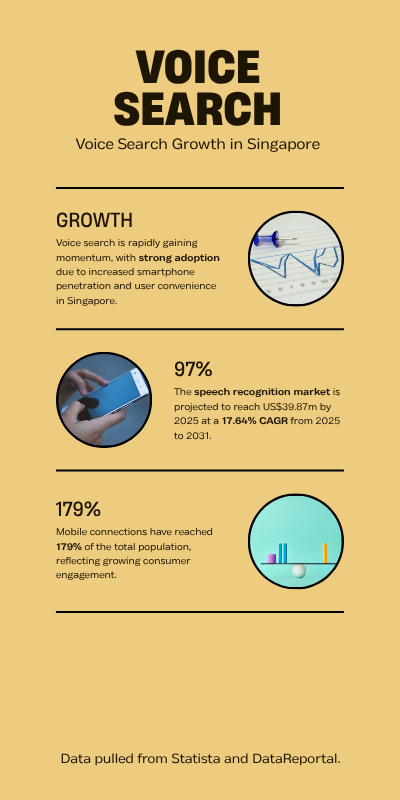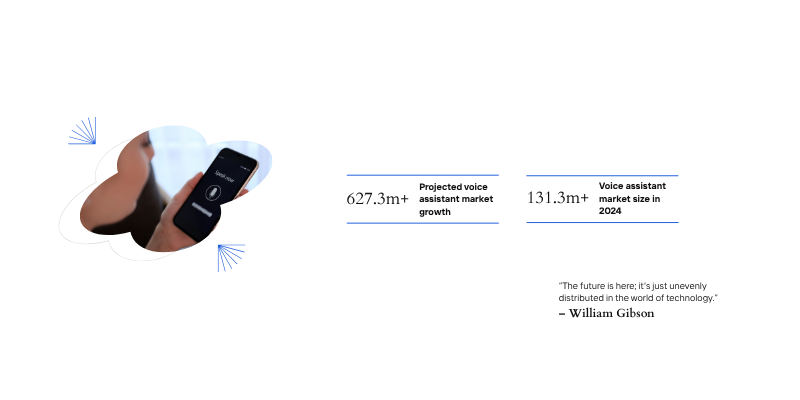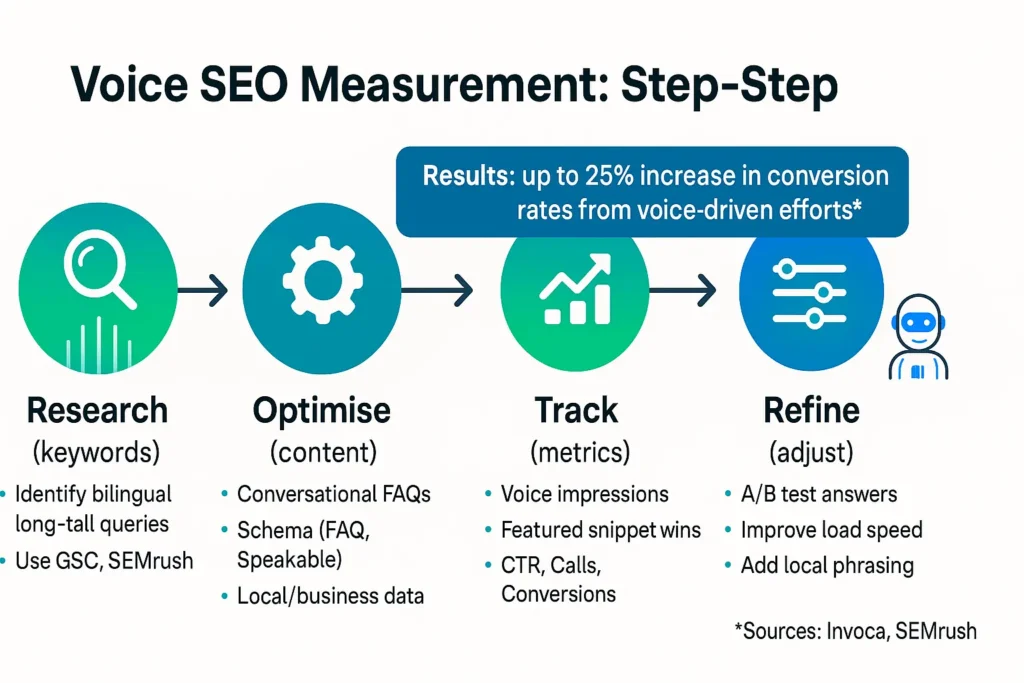Imagine rushing through a busy day in Singapore, and asking, “Where’s the nearest kopitiam with good nasi lemak?” This sight has become more common nowadays, and if your business isn’t showing up in those voice results, you’re missing out on potential clients. Voice search optimisation is transforming how people find particular services, and artificial intelligence is forcing businesses to adapt. With help from professional AI SEO services, voice search optimisation in Singapore zeroes in on multilingual strategies for English and Mandarin queries. It’s all about making your content speak to diverse users, from bustling executives to families chatting in mixed languages.
Understanding Voice Search in Singapore’s Landscape

Voice search has become increasingly vital in modern times, transforming the way we interact with tech. Paired with AI, its use has grown exponentially over the past few years. Here’s how it makes multilingual searches a thing now:
The Growth of Voice Search Adoption
Singapore has long been leading the charts in terms of digital adoption. As of early 2025, internet penetration stands at 95.8%, with over 5.61 million users online. Mobile connections? They’re at a whopping 179% of the population, thanks to multiple devices per person – that’s 10.5 million active lines. And smartphones? Penetration hits 97%, making voice assistants like Google Assistant or Siri second nature for many.
This tech boom fuels voice search. The speech recognition market in Singapore is projected to reach US$39.87 million this year, expanding at a CAGR of 21.5%. Weekly usage? It’s robust, with global trends showing around 36.6% of people relying on voice assistants, and Singapore’s high connectivity suggests even higher local engagement. From MRT commuters checking routes to shoppers hunting deals, voice queries are conversational and quick – think full sentences over short keywords.
Singapore’s Unique Bilingual Context
Ever wonder what really gives Singapore its edge? It’s this effortless mash-up of languages – English rules the roost in work meetings and school halls, but Mandarin? That’s the go-to home language for around 35% of folks here. As expected, it might come off as a dry number at first glance, but it colours everything from casual banter to those family rituals passed down generations. And voice searches? They often flip between English and Mandarin without missing a beat.
This duality is both unique and tough for different reasons: accents, Singlish quirks like “lah,” or local Mandarin slang can all trip up standard tools. Thanks to AI voice optimisation, you can fine-tune for these nuances, ensuring your site ranks for both languages. The voice assistant market here was valued at USD 131.3 million in 2024, set to soar to USD 627.3 million by 2030, driven by multilingual demand.
The Rise of Multilingual Voice Queries in Singapore
Here in the Lion City, flipping between languages mid-sentence is just how things roll—it’s part of the vibe. No surprise then that voice searches pick up on that same easy flow, with folks rattling off stuff like “top cafes in Orchard” one moment, then “乌节路最好的咖啡馆” (best cafes on Orchard Road) the next, or even mashing them together in one go.
Why prioritise multilingual? It’s about inclusivity and reach. With voice tech advancing, users expect seamless switches – English for work, Mandarin for home. Challenges include dialect variations, but AI helps by processing context via natural language understanding.
Start with targeted keyword digs. Use free tools to spot trends, but for Mandarin, layer in local platforms. This ensures your content captures the full spectrum of voice queries in English, Mandarin, and Singapore.
AI’s Role in Voice Search Optimisation

AI isn’t some distant future – it’s powering voice search optimisation right now. In 2025, it’s all about understanding intent and personalising results.
Natural language processing (NLP) is key, turning casual queries into precise matches. For Singapore, AI handles bilingual twists, boosting relevance. Tools analyse patterns, suggesting tweaks for better rankings.
Local SEO ties in too – “near me” searches dominate voice. AI enhances this, with Google’s updates favouring quick, snippet-style answers. The payoff? Sites optimised with AI can see notable traffic lifts from voice traffic, aligning with trends where voice drives more engagement. It’s like having a smart assistant for your SEO.
Key Strategies for English and Mandarin Voice Optimisation
Getting practical, here’s how to roll out Mandarin voice optimisation strategies alongside English ones. These steps are straightforward but powerful.
Tailored Keyword Hunting
Dive into tools for language-specific terms. English: “affordable hotels in Sentosa.” Mandarin: “圣淘沙便宜的酒店” (cheap hotels in Sentosa). Voice queries average 29 words, far longer than typed ones at 3-4 words, so focus on natural phrases.
Conversational Content Style
Make your writing sound just like regular chit-chat, the kind you’d hear over coffee. Schema markup helps pinpoint those readable chunks so voice gadgets can spit them out smoothly. And don’t forget to prioritise creating compliant content for voice search to maintain trust and avoid algorithmic penalties.
Bilingual Strategy and Local Boosts
Implement structured data for business details. Hreflang tags separate language versions. AI plugins handle this automatically.
Mobile-First Speed Tweaks
With 97% smartphone use, aim for under-3-second loads. AMP helps voice rankings – test via Google’s tools.
Localised Mandarin Tactics
Go beyond translation; weave in Singapore flavours like “hawker” terms. AI translators like DeepL, tuned locally, shine here.
Snippet Hunting
Target position zero with crisp answers, 40-60 words ideal for voice readout.
For deeper insights, read more about AI SEO strategies for your business. These align perfectly with voice efforts. Don’t forget resources like Google’s Speakable Schema guidelines.
Tools and Technologies for Success
Arm yourself with these 2025 essentials for AI voice optimisation.
- Google Search Console/Analytics: Free basics to monitor voice traffic.
- SEMrush Voice Features: Competitor analysis, multilingual keyword ideas.
- Ahrefs for Trends: Spots English and Mandarin hot topics with AI smarts.
- Surfer SEO: NLP-driven content tweaks for voice-friendly copy.
Tip: For Mandarin, blend in Baidu. Curious about more? Read our top 10 best apps and tools for AI SEO in 2025 list.
Measuring and Refining Your Voice Search Efforts

Want to make your voice search game strong in Singapore’s fast-paced market? Here’s how to track and tweak your efforts in 2025:
- Check Voice Traffic: Use Google Analytics to spot mobile or smart speaker visits, especially for local searches like “best hawker food in Tampines.”
- Watch Snippet Clicks: Google Search Console shows if your content lands in featured snippets for queries like “Where to find cheap HDB flats?”
- Track Local Keywords: Monitor conversions from “near me” searches in Google Business Profile – think clicks for a café or calls for a service.
- See the Big Picture: Pull data into Google Data Studio to spot trends, like how Singlish queries perform.
- Test Local Flavours: Try Singlish phrases (e.g., “lah, where got good durian?”) vs. Mandarin to see what clicks with locals.
- Keep It Sharp: Leverage AI-driven search optimisation for SMEs by running quick audits with Ahrefs or Semrush to check and refine metrics for mobile speed and schema for voice-ready content.
Curious about the bigger picture? Check Fortune Business Insights’ Speech and Voice Recognition Market report, eyeing a $19.09 billion market by 2025.
Frequently Asked Questions (FAQs) about Voice Search Optimisation in Singapore
What makes voice search optimisation different in Singapore compared to other countries?
It’s all because of that bilingual vibe here—queries often jump between English and Mandarin, stuff like “best dim sum near Bugis” or “附近哪里有好吃的点心,” so you’ve got to use things like hreflang tags and tweak for Singlish twists or local slang. AI steps in to sort those nuances, helping your site show up better on Google Assistant or Siri.
How can AI improve my site’s performance for Mandarin voice queries in Singapore?
With natural language processing, AI digs into those chatty Mandarin searches—like “圣淘沙便宜的酒店” – and tools such as SEMrush throw out solid long-tail keywords while prepping for featured snippets. In the end, it could bump your traffic by 20% or so, really hitting home with the 35% of folks who speak Mandarin.
What are the first steps to optimise my website for voice search in Singapore?
Kick off with some keyword hunting in both English and Mandarin via Google Trends or Ahrefs, then whip up casual FAQs and slap on schema markup to make bits readable for voice devices. Keep your site loading super fast – under three seconds on mobile – check it in Google Analytics, and consider calling us for a quick free AI SEO audit to polish things up.
Wrapping Up: Voice Your Brand in Singapore’s Digital Chorus
In Singapore’s vibrant, bilingual scene, voice search optimisation bridges tech and culture. By blending English and Mandarin strategies with AI voice optimisation, you’ll build stronger connections and drive real results. It’s not just about rankings – it’s about being heard where it counts.
Ready to tune your site? Reach out to The Leading Solution for a free audit today, and let’s amplify your voice.


